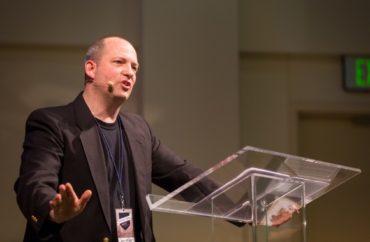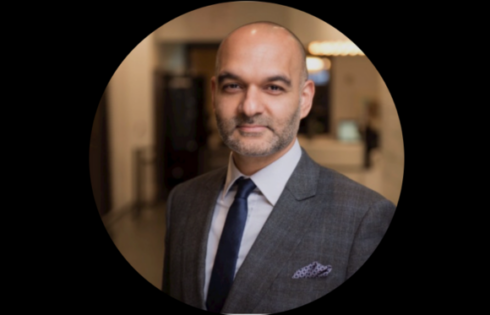
While as an undergrad at Salt Lake Community College in 1991, I gave a presentation in front of my humanities 101 class arguing Jesus Christ is the messiah, citing evidence for his resurrection.
My professor literally cut me off during my presentation and told me it was over, that I couldn’t proceed. He later informed me that I was no longer welcome in the course because of proselytizing.
Here’s the backstory. My professor had been teaching on myth for about six weeks, listing Jesus among them. So after he assigned a project in which students were free to present on virtually anything, I made my move with “when myth became fact, the fulfillment of Messianic Bible prophecy.”
Next I received an “F” for proselytizing. I called a lawyer, met with the college president to notify him that a legal letter was on its way, then waited to see who would flinch first. He persuaded the professor to let me back in the classroom so long as I would shut up.
I wish I could say things got better after that. But they got much worse.
Universities claim to prize diversity and inclusivity. But this means little more than a fixation with certain skin pigment and private parts. It doesn’t include viewpoint diversity—at least not if it is a conservative Christian perspective.
Fast forward several years. I was completing a time working in pastoral ministry with high school and college students. I was sick of seeing my students fall away from their faith whenever they’d attend the secular baptismal font: universities.
Then an idea struck. I pondered the valiant story of the Greeks and the city of Troy. The Greeks failed to broach the walls of the city for a decade. But then they devised a creatively stealth plan to enter via the infamous Trojan Horse. By analogy, I realized that Christians had largely failed to engage the secular universities. The walls were too large. I thought that we needed a stealth plan to reclaim the intellectual voice of Christ from within. Why not start with me?
 I entered the PhD philosophy program at Purdue University in 2004. Six weeks in I was shocked that I was receiving prank calls at 3 in the morning from fellow grad students. They were mocking me for my faith. The next semester I recall receiving a permanent note in my file from a Marxist professor who claimed I was schizophrenic. While he was not a clinical psychologist capable of judging me schizophrenic, he believed religion was the opiate of the masses and that my beliefs were delusional.
I entered the PhD philosophy program at Purdue University in 2004. Six weeks in I was shocked that I was receiving prank calls at 3 in the morning from fellow grad students. They were mocking me for my faith. The next semester I recall receiving a permanent note in my file from a Marxist professor who claimed I was schizophrenic. While he was not a clinical psychologist capable of judging me schizophrenic, he believed religion was the opiate of the masses and that my beliefs were delusional.
I tried to be as stealth as possible and keep my head down to graduate. Nonetheless I could not avoid the hostility. While in my fifth year I was sabotaged near the finish line. The atheist director of grad studies found a way to work in tandem with her longtime friend, my adviser, to root me out. I was ABD (“all but dissertation”) with a 3.5 GPA. I completed all course work, languages, exams, and my funding was even from a different department. But my dissertation committee chair informed me that he dropped me. He said it was because I had “too much of a faith perspective.” Never mind the fact that part of my dissertation topic was on the virtue of faith.
I now had no adviser and no legal recourse. If they don’t want to advise a grad student, then they don’t have to. I couldn’t find an adviser willing to touch me. Without an adviser I couldn’t  even register for research hours. Without doing so, you’re gone a semester later. So much for academic freedom and viewpoint diversity — even in a philosophy department. I had no choice but to terminate with an MA in philosophy. Essentially, I was effectively forced out of the PhD program.
even register for research hours. Without doing so, you’re gone a semester later. So much for academic freedom and viewpoint diversity — even in a philosophy department. I had no choice but to terminate with an MA in philosophy. Essentially, I was effectively forced out of the PhD program.
I enrolled in another PhD program abroad. Meanwhile, I joined a campus ministry to reach out to professors hoping to influence them. I was also an adjunct professor of philosophy and comparative religions at Indiana University. I taught there for years in addition to teaching at Purdue. Even though I typically stacked the deck with textbooks unfavorable to my position, one semester brought a new challenge. I was charged with bias and creating a suicidal environment in the classroom. How so?
When the text dealt with homosexuality, it grossly misrepresented views that opposed homosexuality like the Bible or the natural law approach. In an effort to educate rather than merely indoctrinate, I offered another, more robust, perspective than the text in class that better represented the other side. But I apparently touched a sacred cow. A gay student in my class who was a former pastor reported me to the administration. He claimed that the suicide rate in the LGBT community was already high enough. He said I created an environment where he was fearing for his life. He didn’t want to become another victim.
Before long I was facing a virtual administrative tribunal. This was in 2013. I brought in Alliance Defending Freedom to take my case pro bono. Ironically, I was aided by two atheist students unfriendly to my view but friendly to free thinking and free speech. These students forced the administration to listen to my lectures they’d recorded. They threatened the university that if I were unjustly punished, they’d transfer to another university that demonstrated free thought. ADF letters helped. In the end, I was exonerated.
Following these experiences as an undergrad, grad, and professor, I realized how hostile universities can be at all layers of strata if you don’t believe the right doctrines. Higher education has become so thoroughly secularized that an alternate viewpoint is foreign, unwelcome, attacked and pushed out. Ultimately I finished my PhD in philosophical theology from the University of Aberdeen in Scotland in 2014.
Surveys often show the ratio of liberal to conservative professors for those over age 65 preparing to retire is 12:1. For the new scholars coming in under age 36 it is 23:1. In some departments it is literally 70:1. There is a light at the end of the tunnel and it is an oncoming train.
Instead of a Trojan Horse approach, today I fight with a full frontal assault. Shortly after earning my PhD I became president and CEO of Ratio Christi: Campus Apologetics Alliance.
We believe not only in defending the faith, but also in defending the ability to defend the faith, whether it is speech codes, speech zones, denial of campus funds, or variant all-comers policies where we cannot get clubs approved if we insist on our leaders being Christians.
We’ve been involved in at least 17 cases of legal proceedings, won a federal victory at one university and recently won another this month.
As the university goes, so goes the culture. The university is the most influential institution in western civilization. From it come our doctors, lawyers, political leaders, journalists, artists, k-12 educators and even future professors. Stalin once said “ideas are more powerful than weapons. We don’t allow our enemies to have weapons. Why should we let them have ideas?” And Abraham Lincoln said, “the philosophy in the classroom in one generation will be the philosophy of government in the next.”
Christians largely founded the university as a prominent feature of western civilization. But today we fight for our right to exist on the campus. The powers of secularism don’t lose any sleep over Christian marginalization. But Christians who sleep rather than fight for our right sacrifice not only our voice, but that of western civilization.
Dr. Corey Miller is president and CEO of Ratio Christi. He has served on pastoral staff at four churches and has taught nearly 100 college courses in philosophy, theology, rhetoric and comparative religions at various campuses (Purdue, Indiana University, Multnomah University and Ecola Bible College). From 2009 to 2015 he served on staff with Cru’s Faculty Commons ministry at Purdue. He is an adjunct professor of philosophy and comparative religions at Indiana University-Kokomo. He is author of Leaving Mormonism: Why Four Scholars Changed their Minds. Miller lives with his wife Melinda and three children in Indiana.
Like The College Fix on Facebook / Follow us on Twitter





Please join the conversation about our stories on Facebook, Twitter, Instagram, Reddit, MeWe, Rumble, Gab, Minds and Gettr.